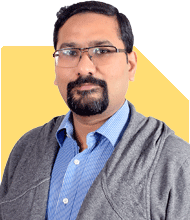Krishna Kumar | Answer |Ask -Follow
Workplace Expert - Answered on Apr 23, 2024
Before branching out on his own, he worked with companies like Microsoft, Rediff, Flipkart and InMobi.
With over 25 years of experience under his belt, KK is a regular speaker at industry events and academic intuitions, both in India as well as abroad.
KK completed his MBA in marketing from the Sri Sathya Sai Institute of Higher Learning in Andhra Pradesh and his management development programme from XLRI, Jamshedpur.
He has also completed his LLB from Nagpur University and diploma in PR from Bhavan’s College of Management, Nagpur, where he was awarded a gold medal.... more

I am 39 years old masters in finance & working as a presales manager in a business process outsourcing company. I have only 4 year of experience in presales & 10+ years of experience in tele marketing & lead generation.. my problem is i have not worked with big brands & have been working with small & msme companies. Now i want to pursue my career in presales but i am not getting calls for interviews.. i want to upskill myself & be competent to get good opportunities.. please if you can suggest how should i shape my career as i dont have any degree or certificate in IT
You can join digital marketing companies which offer lead generation services for B2B and also B2C companies.
This way you will get chance to work for big brands.
All the beat
You may like to see similar questions and answers below
Krishna Kumar | Answer |Ask -Follow
Workplace Expert - Answered on Apr 12, 2024
Aashish Sood |127 Answers |Ask -Follow
CAT, Management Expert - Answered on Jan 07, 2024
Nayagam P P |10853 Answers |Ask -Follow
Career Counsellor - Answered on Jun 21, 2024
Radheshyam Zanwar |6744 Answers |Ask -Follow
MHT-CET, IIT-JEE, NEET-UG Expert - Answered on Dec 14, 2025
Radheshyam Zanwar |6744 Answers |Ask -Follow
MHT-CET, IIT-JEE, NEET-UG Expert - Answered on Dec 14, 2025
Dr Dipankar Dutta |1840 Answers |Ask -Follow
Tech Careers and Skill Development Expert - Answered on Dec 14, 2025
Dr Dipankar Dutta |1840 Answers |Ask -Follow
Tech Careers and Skill Development Expert - Answered on Dec 13, 2025
Dr Dipankar Dutta |1840 Answers |Ask -Follow
Tech Careers and Skill Development Expert - Answered on Dec 13, 2025
Mayank Chandel |2575 Answers |Ask -Follow
IIT-JEE, NEET-UG, SAT, CLAT, CA, CS Exam Expert - Answered on Dec 13, 2025
Radheshyam Zanwar |6744 Answers |Ask -Follow
MHT-CET, IIT-JEE, NEET-UG Expert - Answered on Dec 13, 2025
Mayank Chandel |2575 Answers |Ask -Follow
IIT-JEE, NEET-UG, SAT, CLAT, CA, CS Exam Expert - Answered on Dec 13, 2025
Mayank Chandel |2575 Answers |Ask -Follow
IIT-JEE, NEET-UG, SAT, CLAT, CA, CS Exam Expert - Answered on Dec 13, 2025
Kanchan Rai |646 Answers |Ask -Follow
Relationships Expert, Mind Coach - Answered on Dec 12, 2025























